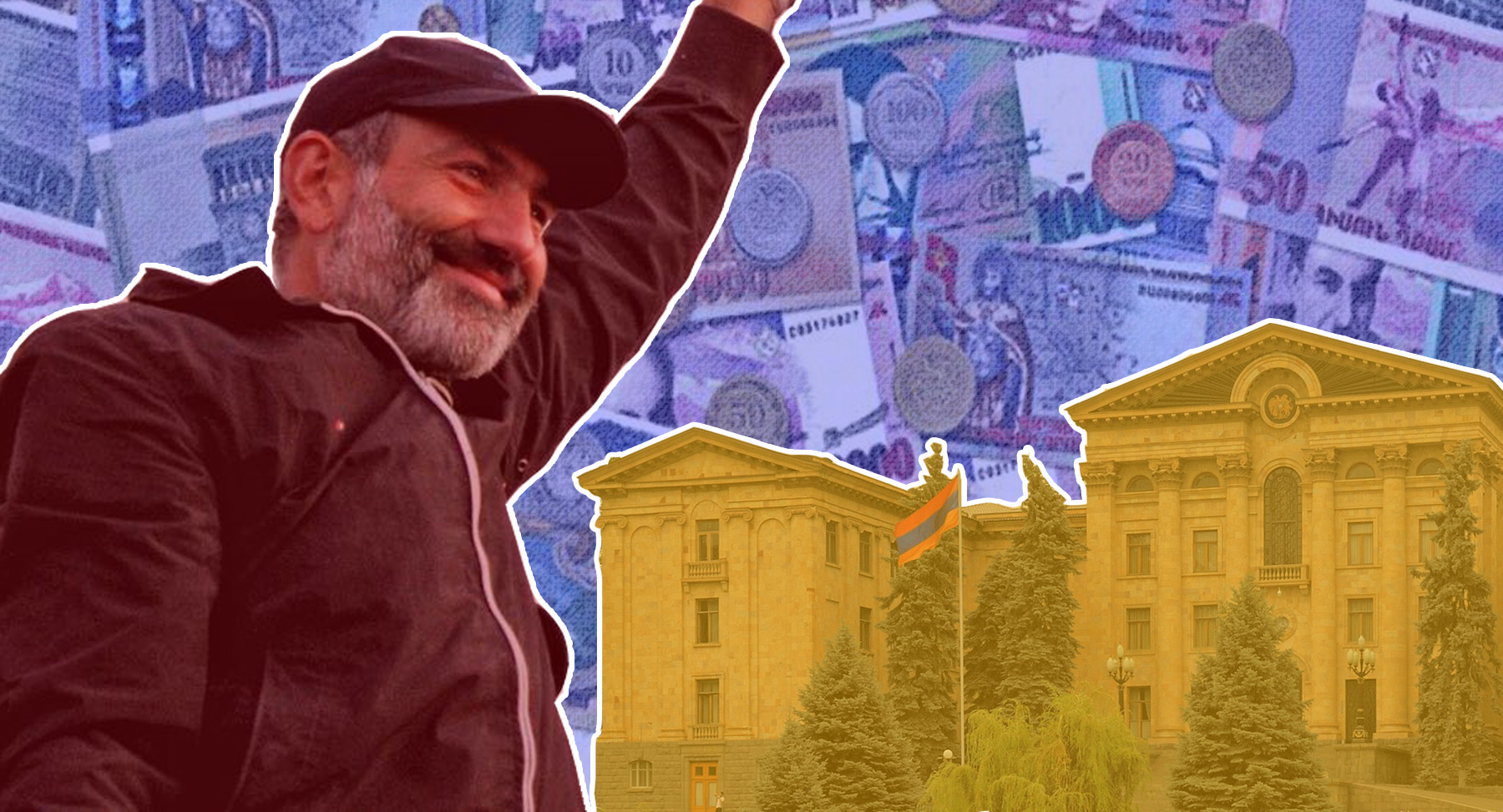

Pashinyan and his revolutionary team have begun their second march — this time as a government parading towards economic revolution. Despite their ambitious goal to shake up Armenia’s economy, which for years has been impaired by systematic corruption, feudal-like oligarchs and shady deals behind closed doors, their proposed ‘economic revolution’ should do more to address the needs and expectations of the people who made the Velvet Revolution possible.
For the past several weeks, virtually all discourse in Armenia has been related in some way to the economy. Though the public waited patiently for the turbulence of the country’s political scene to slowly calm down following December’s snap parliamentary elections, it soon became apparent that the most pressing issues of poverty, unemployment, and social inequality could no longer wait to be addressed.
Prime Minister Nikol Pashinyan and his team, who secured an overwhelming majority in parliament and the government, understood this. They prepared a 2019–2023 government plan that aimed to do just what thousands of people expected them to do and proposed concrete steps and policies to improve the living conditions of those affected by the ‘virtues’ of the past regime. However, this plan was harshly criticised for a lack of precision and clarity.
[Read on OC Media: Armenia’s new plan: an economic revolution or empty promises?]
With the spotlight on the government plan, a new notion emerged as a product of the renewed political and economic thought — the concept of an economic revolution. The public was assured that through such a method, everything would ‘get better and better’. However, the more the government explained their plans, the more questions arose and the more problematic the plan seemed.
After three days of discussion, Parliament voted 88–40 in favour of the government’s plan. Both the Prosperous Armenia and Bright Armenia parties strongly criticised the government.
The government’s plans to eliminate extreme poverty, attract foreign direct investment, fight corruption, increase exports, create jobs, and increase salaries, pensions, and public sector benefits are reforms that are very much needed — hardly anyone would argue against them. What matters here, however, is how to implement all of the above.
‘What is Pashinyan?’
The problems behind Pashinyan’s concept of an ‘economic revolution’ are multifaceted but can be broken down into three broader issues: ideology, labour, and poverty.
Back when Pashinyan was about to be appointed Prime Minister by the previous parliament, he was asked one of the most important questions that the former political elite could come up with: ‘What is Pashinyan?’
Is he a liberal? a social democrat? a socialist? a communist? — in other words, where on the political ideological spectrum does he stand? Rather than answering, Pashinyan dodged the question, claiming that the ‘time of -isms is over’.
This stance of denying that ideology matters has been deservedly criticised at numerous points throughout the past year. In the run-up to snap parliamentary elections, with the exception of the newly formed social-democratic Citizen’s Decision Party, the political programmes of all the parties, including Pashinyan’s My Step Alliance, were amorphous, failing to lay a stake on the ideological compass. This discourse during a time of transition had the potential to turn the status quo, a prolonged ideological vacuum, upside down.
Now, several months and dozens of controversial speeches later, Pashinyan and his team’s attitudes on different socio-political and economic issues have revealed themselves — they are the new liberals. Their tendency to lean towards the promise of free-market capitalism and favour the logic of neoliberal reforms and policies has already been observed and criticised by some on the left.

The invitations for international-based capital to come to Armenia to ‘get rich and enrich’, talk of a flat income tax ‘based on the needs and will of investors’, meetings with local business elites, and the ongoing process of government optimisation, among other things, demonstrate this neoliberal mindset.
Even Varazdat Karapetyan, an important figure in the majority My Step bloc restated during one interview that ‘yes, this is a liberal model [of the economy]’.
Despite all of these clear definitions, Pashinyan stood strong during hearings in Parliament, rejecting the importance of ideology: ‘150 years ago, some people decided that in 2018, when we create a political unit, we will have to choose either this or that [ideology]… We are creating another dimension of thinking, we are going to act in the realm of another thought’.
In the same speech, Pashinyan managed to put responsibility for the ‘economic revolution’s’ success on the shoulders of the public, claiming that ‘the numerical parameters of the economic revolution actually depend on how many citizens will respond to our call to become economic revolution activists and how many people will decide to use the opportunities created by the same revolutionary platform’.
This concept of an economic revolution, where one bets on the invisible hand and puts such a strong emphasis on the idea of the market regulating itself, is reductionist and short-sighted, especially when looking at the experience and consequences of neoliberal economic reforms implemented in neighbouring Georgia.
Just as counterproductive are widely held notions of labour and poverty in Armenia. Pashinyan’s expressed views that ‘350,000 people toil to provide for 800,000’, and that ‘poverty is in our minds’, show how over time, the country’s economic failures have been over-simplified, laying the blame on the individual and their character.
The idea that people do not work because they are lazy and that people are poor because of their mentality have been elaborated on by Pashinyan in several different ways.
The most vivid examples were when Pashinyan complained that there are people who sit around in their yards all day thinking of being employed but doing nothing to actually get a job, and when he sided with a businessman who claimed his textile factory had problems finding people to fill vacancies.
Interestingly, very little has been done to find out the real picture of labour conditions and wages that the market has to offer.
Defending the rights of a diverse majority
There is an impression that the only voice strong enough to be heard and paid attention to is the businessman’s voice. In fact, this voice is so strong, it is often later reproduced by the government and reflected in their policies.
This has the alarming potential to turn the Velvet Revolution into a revolution for the rich, the privileged, and those with the knowledge and resources to answer Pashinyan’s call to become ‘activists’ of the economic revolution. Such policies, attitudes, and positions may seriously undermine solidarity within society.
The revolution gave hopes of justice to thousands who were exploited for years by corrupt businesses and individuals with noxious and insatiable ambitions to rule — this mission cannot be jeopardised.

Pashinyan and his team should balance their approach by accepting criticism and looking beyond the judgement coming from the media and individuals affiliated with the former regime. They should also accept the helping hands of the professional community, activists, and various groups that have been vocal about the proposed reforms.
However far-reaching and sometimes invisible the tentacles of the former regime, and those who benefited from their policies, are, there is no need to constantly slide towards a policy of us versus them and make premature decisions due to this mentality.
The impulse of those in power to close themselves off in their own bubble should be resisted both from within — through self-reflection and self-criticism — and from the outside.
That being said, the motives to finally bring economic prosperity to the country are clearly sincere and earnest. What needs to be understood, however, is that honourable intentions are not enough.
Those at the top need to defend the rights and interests of a diverse majority rather than creating spaces of exclusion, discrimination, and exploitation. This is something that a working democracy should be able to accomplish.
Since so much is at stake, instead of making promises of speedy economic growth, it would be wiser and more mature to adopt a process of decision-making that is truly inclusive and stems from an evaluation of the real needs and expectations of the people who stood up and made the Velvet Revolution possible.
The opinions expressed in this article are author’s alone, and do not necessarily reflect the views of OC Media’s editorial board.








